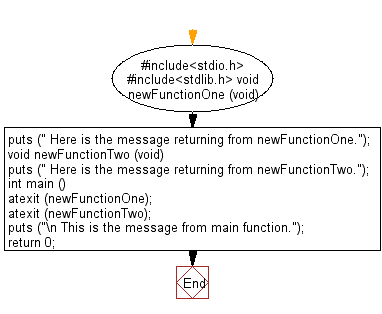C Exercises: Set a function that will be executed on termination of a program
C Variable Type : Exercise-15 with Solution
Write a C program to set a function that will be executed on termination of a program.
Sample Solution:
C Code:
#include<stdio.h>
#include<stdlib.h>
void newFunctionOne (void)
{
puts (" Here is the message returning from newFunctionOne.");
}
void newFunctionTwo (void)
{
puts (" Here is the message returning from newFunctionTwo.");
}
int main ()
{
atexit (newFunctionOne);
atexit (newFunctionTwo);
puts ("\n This is the message from main function.");
return 0;
}
Sample Output:
This is the message from main function. Here is the message returning from newFunctionTwo. Here is the message returning from newFunctionOne
Flowchart:

Improve this sample solution and post your code through Disqus
Previous: Write a C program to convert a string to a double.
Next: Write a C program to return the absolute value of an integer.
What is the difficulty level of this exercise?
Test your Programming skills with w3resource's quiz.
C Programming: Tips of the Day
Static variable inside of a function in C
The scope of variable is where the variable name can be seen. Here, x is visible only inside function foo().
The lifetime of a variable is the period over which it exists. If x were defined without the keyword static, the lifetime would be from the entry into foo() to the return from foo(); so it would be re-initialized to 5 on every call.
The keyword static acts to extend the lifetime of a variable to the lifetime of the programme; e.g. initialization occurs once and once only and then the variable retains its value - whatever it has come to be - over all future calls to foo().
Ref : https://bit.ly/3fOq7XP
- New Content published on w3resource:
- HTML-CSS Practical: Exercises, Practice, Solution
- Java Regular Expression: Exercises, Practice, Solution
- Scala Programming Exercises, Practice, Solution
- Python Itertools exercises
- Python Numpy exercises
- Python GeoPy Package exercises
- Python Pandas exercises
- Python nltk exercises
- Python BeautifulSoup exercises
- Form Template
- Composer - PHP Package Manager
- PHPUnit - PHP Testing
- Laravel - PHP Framework
- Angular - JavaScript Framework
- Vue - JavaScript Framework
- Jest - JavaScript Testing Framework
